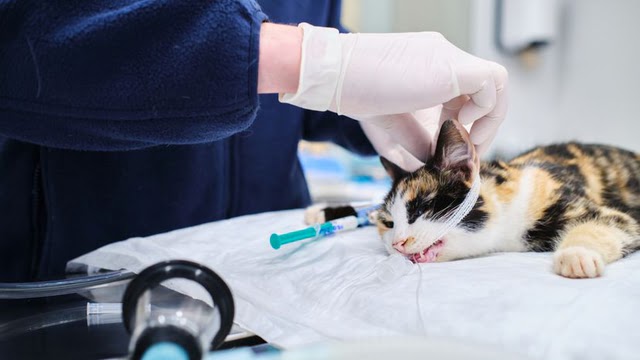Quck answer
If you suspect your cat has been bitten by a snake, take them to the vet immediately. Symptoms of a snakebite can include swelling, pain, redness, and difficulty breathing. Do not attempt to treat the bite yourself, as it could potentially make the situation worse. The vet will likely administer antivenom and provide supportive care such as pain relief and IV fluids. Prevention is key, so keep your cat indoors and avoid areas where snakes may be present.
Pets

It’s important to keep cats away from snakes to avoid bites. Abraham Gonzalez Fernandez / Getty Images
Snakebites are a rare occurrence in North America, but it’s important to know how to care for a cat that has been bitten. Whether the snake is poisonous or not, proper care is necessary to help your furry friend recover.
If you suspect your cat has been bitten by a snake, look for signs such as pale or white gums, rapid breathing, or a rapid heartbeat. Even nonpoisonous snakes can cause harm if the bite is not properly treated.
Poisonous Snakebite
If you suspect a poisonous snake has bitten your cat, look for fang marks, swelling, vomiting, difficulty breathing, paralysis, or convulsions. If the snake is dead, bring it to the vet for identification. If not, try to remember any identifying marks. Follow these steps:
Step 1: Approach your cat carefully, and if necessary, restrain them if they are anxious or nervous.
Step 2: Clip the hair around the bite area.
Step 3: Flush the area thoroughly with 3 percent hydrogen peroxide.
Step 4: Take your cat to the vet immediately.
Nonpoisonous Snakebite
If you suspect a nonpoisonous snake has bitten your cat, look for a U-shaped bite mark and pain in the area. If the snake is dead, bring it to the vet for identification. If not, try to remember any identifying marks. Follow these steps:
Step 1: If you’re unsure whether the snake is poisonous or not, treat it as if it were poisonous and follow the steps above.
Step 2: Take your cat to the vet immediately.
В©Publications International, Ltd.
FAQ
1. What should I do if I suspect my cat has been bitten by a snake?
If you suspect your cat has been bitten by a snake, it’s important to seek veterinary care immediately. Even if you’re unsure if it was a snakebite, it’s better to be safe than sorry. Signs of a snakebite can include swelling, pain, lethargy, vomiting, and difficulty breathing.
2. Can I treat my cat’s snakebite at home?
No, it’s not recommended to try to treat a snakebite at home. Snakebites can be very dangerous and require prompt veterinary attention.
3. What will the veterinarian do to treat my cat’s snakebite?
The veterinarian will assess the severity of the snakebite and provide appropriate treatment, which may include antivenom, pain management, fluid therapy, and wound care. In some cases, hospitalization may be necessary.
4. How long does it take for a cat to recover from a snakebite?
The recovery time for a cat with a snakebite can vary depending on the severity of the bite and the treatment provided. Some cats may recover in a few days, while others may take several weeks to fully recover.
5. Can my cat die from a snakebite?
Yes, a snakebite can be fatal for a cat if left untreated. It’s important to seek veterinary care as soon as possible if you suspect your cat has been bitten by a snake.
6. How can I prevent my cat from being bitten by a snake?
Preventative measures include keeping your cat indoors during peak snake activity times, such as hot summer months, and keeping your yard free of debris that can attract snakes. You can also use snake repellent products around your home and yard.
7. Is there anything I can do to help my cat recover from a snakebite?
You can provide a quiet and comfortable place for your cat to rest and recover. Follow any instructions from your veterinarian regarding medications or wound care.
8. Can a cat build immunity to snake venom?
No, cats cannot build immunity to snake venom.
9. What types of snakes are most likely to bite cats?
The types of snakes that are most likely to bite cats include venomous snakes such as rattlesnakes, copperheads, and cottonmouths.
10. Can I take my cat hiking or camping in areas where snakes are common?
It’s not recommended to take your cat hiking or camping in areas where snakes are common. It’s better to keep your cat indoors or in a safe, enclosed outdoor area.
11. What should I do if I see a snake near my cat?
If you see a snake near your cat, it’s important to remove your cat from the area immediately. Do not try to handle or catch the snake yourself. Call a professional wildlife removal service to remove the snake from your property.





Leave a Reply